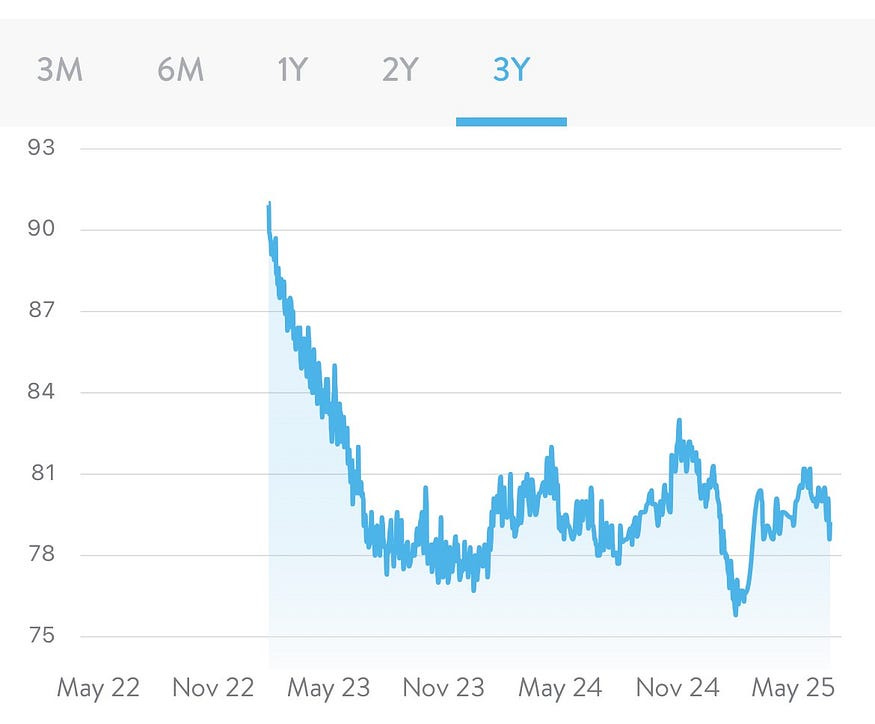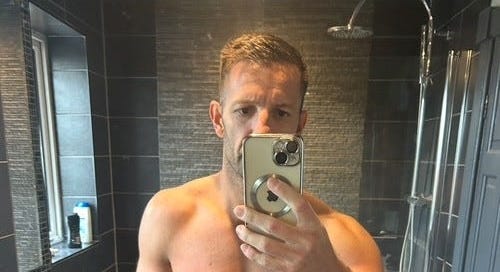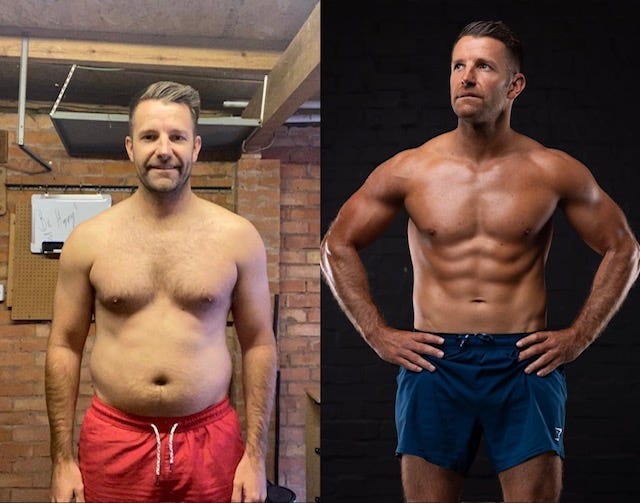The Most Effective Method I Used To Melt My Belly Fat.
“You don’t rise to the level of your goals — you fall to the level of your systems.”
This blog is about Crypto, NFTS, and modern finance, but over the last three years, I have been on my own fitness journey. After a number of folks reached out asking, “Where’d the fitness blogs go?” I thought I’d test out the waters here. If it helps one person out, it would have been worth it!
It flipped everything I thought I knew about getting lean.
I dropped over 58 pounds in under a year and have kept visible abs ever since — so coming on 3 years.
This isn’t some shameless self-aggrandising post or a ploy to impress strangers on the internet — despite what a few spicy commenters suggested. I want to add credibility to the conversation we’re about to have.
Regular readers know that I’ve done the rounds: Keto, Paleo, 5:2, skipping breakfast, and tried my hand at being a full-blown lettuce-eating vegan. Every single one left me back at square one — confused about how to lose weight, frustrated at the lack of results, and feeling like I’d headbutted a barbell.
The problem? Diets, in general, are designed for lab conditions, not real life. They fall apart the moment your mate invites you out for dinner, or you take a weekend trip.
What finally worked wasn’t radical.
It was a standard weight loss approach — just with a few powerful tweaks. Once I made them, the results felt borderline unreal.
Strap in. Let’s break it down.
Not all calories are equal.
I moved more. I ate less. The weight dropped.
As simple as this sounds, the one thing I was always missing was a tool to actually measure and control things. I’d just eyeball it or guess — and that never worked.
I hate to break it to you, but if you’re not counting calories or using technology to support that process, you’re basically just winging it.
I use the free version of MyFitnessPal, the app, to scan every food and count every calorie that goes into my mouth.
It’s not revolutionary. But effective.
Still, not everyone’s thrilled about it. One particularly fired-up commenter DM’d me this gem:
“I’m sick to death hearing you talk smack about losing 58 pounds and saying it’s because of calorie counting. That ain’t sh*t. Everyone I know who tried it lost weight, then piled it all back on. Appetite hormones are the only thing that matter. Everything else is bullsh*t.”
Aside from the colourful language, he was not entirely wrong. Other commentators also replied:
“No, that negative, unhappy person is NOT right. Thirty pounds may mean “sh*t” to that person, but it’s not “sh*t” to everyone. If you’re not fat but want to lose weight, 30 pounds may be just what you need.🙂”
I bang on about calorie counting because it is a valuable tool — but it’s not the whole picture.
Most people can’t stick to it because their cravings take the wheel. I’ve been there, and every time I messed it up, it was the same root cause: I got my macronutrient balance wrong.
It usually goes something like too little fat, too many carbs, and insufficient protein. The next thing I knew, I was carb-crashing and ending up elbow-deep in the snack cupboard like an addict trying to get my next hit.
The medical explanation for why this happens is that your body breaks down carbohydrates into glucose, which leads to a quicker release of energy. If you only eat carbs without pairing them with protein or fats, your blood sugar can spike and then crash — causing those boom-and-bust energy levels.
Glucose is a simple sugar that your body produces from breaking down carbohydrates for energy. It ends up in your blood as blood sugar. Consuming a lot of sugar or processed carbs in a short period of time will raise your blood sugar, and can later result in a sugar crash.
Technically, if you eat fewer calories than you burn, you’ll lose weight. But will you feel good, stay full, or actually stick to it? That’s a different game.
That’s why I track more than just calories. I eat around 2,000 a day — a 500-calorie cut from my maintenance. But I also aim for 175g of protein daily (about 2.2g per kilo of body weight), And I keep my meals roughly split: 35–40% carbs, 35% protein, and 25% fat.
It stabilises my energy levels.
Courtney Cary, MS, RD, a senior registered dietitian in the Department of Medicine at Baylor College of Medicine, says to eat more complex carbohydrates and to lead with protein dishes in each main meal.
If your carb intake mainly consists of foods like white rice, white bread, and pasta, you’re consuming carbs that don’t have fiber or protein to assist with blood sugar control. These are known as simple carbohydrates. Instead, opt for complex carbohydrates which are much better for stabilizing blood sugar since they contain protein and fiber that take longer to digest. They also typically have a low glycemic index, meaning they cause a more gradual rise and fall in blood sugar levels.
Steal this simple weight loss super tool.
When I tried (and failed) to lose weight in the past, my macronutrients were so out of whack that I’d crash harder than the stock market by 2 p.m. every day — and I never understood why.
I blamed it on being unfit.
But the real culprit? My carb-heavy meals were spiking my blood sugar, giving me a quick burst of energy. Followed by a sharp drop about 20 minutes later.
Another minor fix made a big difference: I started drinking water first thing in the morning with a pinch of sea salt and a slice of lemon. I leave the bottle out overnight and sip it as soon as I wake up.
This does two things:
It curbs cravings.
It helps my body stay balanced when I’m in a calorie deficit — no more energy crashes or mid-morning mood swings.
The lemon makes it taste bearable (though I don’t squeeze it — it’s too acidic for the teeth). It gives me the taste of a soft drink without the calories.
As fitness coach Eddie Abbew puts it:
“Salt has never been the enemy. We sweat salt, we p*ss salt, we cry salt. Eat more salt than anybody.”
Even the National Institutes of Health backs this up. According to modern medical research, salt helps regulate fluid balance, move nutrients into cells, support nerve function, regulate blood pressure, and even assist with digestion.
Since adding salt water to my mornings, I don’t crash. I don’t crave. My energy’s consistent — probably the same reason some athletes start their day with electrolytes.
To be clear, this isn’t some magic fat burner. But it’s a smart tool for managing energy while in a calorie deficit — because it supports hydration and electrolyte balance and helps me feel better without adding calories.
Don’t overdo the salt — always get medical advice if you’re unsure.
My simple activity plan.
Tracking daily calories doesn’t tell the whole story — but it’s like watching your car’s fuel gauge.
It gives you a solid idea of where things stand.
Sure, it won’t tell me if I’m low on oil, water, or brake fluid — but it covers the essentials: fuel.
At least I know how much energy I’ve got left to burn.
When my nutrition’s dialled in, even on a calorie deficit, I feel like I’ve got more energy — not less. No 2 p.m. slumps. No matchsticks holding my eyelids open.
Things clicked when I trimmed 500 calories a day and paired it with a simple workout plan.
That’s a 3,500-calorie weekly deficit — enough to drop about half a pound to a full pound every seven days.
And my routine? It’s about as complicated as Velcro shoelaces.
Here’s what I do:
10,000 steps a day
Three 5K runs a week
Three 45-minute weight sessions
That’s it. Nothing fancy. No need for spreadsheets or Olympic discipline. Just consistency, balance, and paying attention to the right dials.

One of the most crucial diet rules no one talks about.
It’s to keep things simple regarding meals: Three mains. Under 500 calories each. Job done.
It’s not because I’m obsessive — but because it makes life easier. Round numbers make for easy tracking. It’s just enough food to feel satisfied without needing to be airlifted off the sofa.
For someone like me with a reasonably average BMR, that puts me at around 1,500 calories across breakfast, lunch, and dinner — which gives me about 500 calories of wiggle room for the fun stuff.
That might be a cappuccino, a Grenade bar, a quick shake, or — now that the British weather’s behaving — a 350-calorie ice cream and a missed protein target (worth it).
Here’s what a typical day looks like — nothing Michelin-starred, but it does the job:
Breakfast.
Egg & Bagel Sandwich:
Two eggs on a whole wheat bagel with low-fat cheese, plus a slice of tomato and some spinach so I can tell myself I’m getting my greens in—roughly 350 cals.
Morning Snack:
Half a Grenade bar — 110 cals. Enough to stop me raiding the fridge early.
Lunch.
Turkey & Avocado Wrap:
150g turkey breast, whole wheat wrap, slices of avo, shredded lettuce, and a tiny blob of mustard or light mayo. Roughly 400 cals.
Afternoon Snack:
The other half of the Grenade bar (another 110 calls) + A cappuccino made with skimmed milk — around 130 cals.
Dinner.
Grilled Chicken Salad:
150g chicken breast on a bed of mixed greens, tomatoes, and cucumber, dressed with a bit of olive oil and balsamic vinegar. Around 350 cals.
It's not rocket science. Just consistency.
And a rough 2,000-calorie day that leaves me full, energised, and not feeling like I’m missing out on life.
Forget trying to lose weight. Focus on building a better system.
If you dug into the dusty corners of my brain to find the one thing that actually changed everything — it’s this:
Willpower is overrated. Systems win.
For six years, I’d hurl myself into new fitness routines with the enthusiasm of a puppy on Red Bull — and every time, I’d burn out. Why? Because I was relying on brute-force motivation.
It was exhausting.
Fitness goals sound great in theory, but they rarely stick. Because there’s no finish line — it’s not a 30-day challenge. It’s a lifestyle.
Having a system is something you can show up to, even when you’re not feeling it or get derailed.
James Clear nailed it in Atomic Habits when he said:
“You do not rise to the level of your goals. You fall to the level of your systems.”
When I was still green to all this, I didn’t trust the process. I second-guessed everything.
So I found someone who had a process — a coach. Plugging into their system stripped out all the guesswork and overthinking. No more mental gymnastics — wondering if what I was doing would work.
Just turn up. Follow the system. Let it do its thing.
And surprise — it worked.
Let tech guide you — and keep you honest.
I used to pay $40 a session for a personal trainer three times a week.
After a few months, I realised I wasn’t made of money.
Worse — we never talked about nutrition. There was no shared dashboard, no tracking, no bigger picture. Just workouts.
Switching to an online coach who used tech properly changed everything. Now, there’s nowhere to hide — and that’s a good thing.
We both see the same data. No guesswork. Just clarity.
I log my water.
Weigh in daily.
Snap progress pics monthly.
My phone tracks my steps.
I measure key body areas weekly.
I scan meals to track calories and macros.
It’s not about being obsessive — it’s about staying aware.
Tech, like apps on your phone, gives you a simple way to stay on track and spot trends before they spiral a bit, like my weight loss chart from earlier.
It doesn’t have to be fancy. It just has to work.
And when it does, everything feels easier.
Be the tortoise, not the hare.
This one was tough for me to get my noggin around.
I always wanted to take on the world with my fitness regime, and anything less felt like a failure.
Setbacks have defined my fitness journey for as long as I can remember. But once I got this mindset hack of epic proportions, everything changed.
You only need to move the needle forward — by how much is irrelevant.
Whenever I’d have a bad day eating, I’d hit what coach Chris calls the “F*ck it button” — excuse the French. It’s that psychological self-destruct button we all have that says — bugger it, I’ve messed up, so there’s no point heading to the gym, or I’ve eaten poorly, so I might as well keep going and start again next week.
This kicking the can down the road is how I went backwards for as long as I can remember working in that god-forsaken office job.
It’s how I stayed obese and unhappy.
It comes down to one simple reason: You must value the compounding effects of small actions that would lead to enormous changes in your life.
When I did, everything changed.
Final Thoughts
When I write something absurdly simple, people tend to dismiss it as too good to be true.
It’s undeniable, and I’m living proof.
Don’t get caught up too much with a calorie-denial crowd — understand there is a nuance: If your goal is to lose weight, calorie restriction with good nutrition (macros) is worth a try.
People have asked me about fasting, which I know is incredibly effective for many folks, but it’s not for me. I don’t like the feeling of being hungry. Being hungry and a writer is a recipe for torture.
Simple daily activities you enjoy usually become the thing you repeat.
A pinch of sea salt and lemon in water works a charm.
I follow a simple diet plan and rotate a few dishes. The simplicity removes the decision-making, and then the consistency flows.
Losing weight is not the target — finding a system you can repeat blindfolded is, and if you can’t execute it yourself, borrow someone else’s system.
Tracking via the use of technology is an underrated truth of fitness.
Keep jabbing at progress — speed doesn’t matter. Just make sure you’re always nudging that needle forward.
It worked for me, so why not you?
Special note from Author:
Chris, the online fitness coach who completely transformed my fitness journey, is offering a FREE discovery call exclusively for my readers.
If you’re ready to take control of your fitness and create a personalised plan that fits your lifestyle, don’t miss this opportunity. Click here to book your FREE call now.






You’re right about insulin spikes. Processed food is the enemy. Eat natural, replace processed snacks with raw nuts or fruit. Cut out booze, all soft drinks. Tea, coffee, milk, water are all good. Not latte, obviously.
When I exercise I drink water, when I finish I drink milk. Sports drinks are useless unless you’re a professional athlete, even then it’s moot.
Cook things from raw ingredients.
Batch cook to save time.
Enjoy real food.
The macro discussion and having a system and a fuck it button is spot on. I don't try to "make up" for a momentary indulgence, it all comes out in the wash, and "making up" (or buying it in advance) with deprivation is just demoralizing for no benefit. Don't underestimate the importance of weight training. I don't even do cardio explicitly because I get it in a regular weight workout, with the bonus of more muscle burning calories at rest. Thanks for the post.